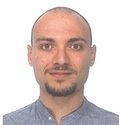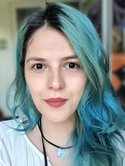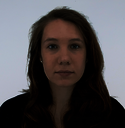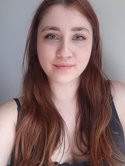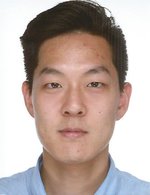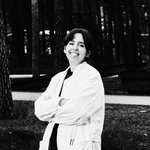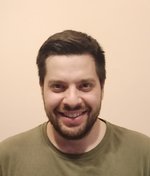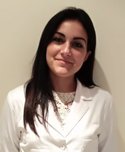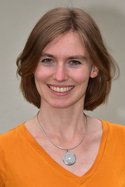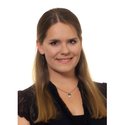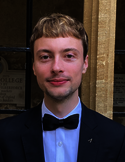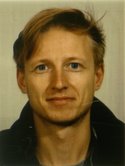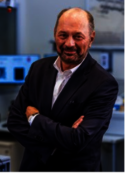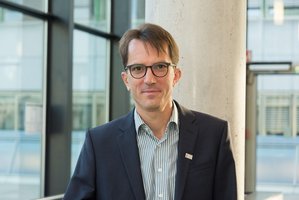Marco Calvaruso (Italy)
My name is Marco Calvaruso, I have a master’s degree in Medical Biotechnologies and a PhD in Pathobiology. Since 2018, I am a research fellow at the secondary unit of the Institute of Molecular Bioimaging and Physiology of the Italian National Research Council (IBFM-CNR), sited in Cefalù. Our research focuses on the identification of predictive biomarkers of response to radiotherapy (photons and hadrons). Since 2018, I am a research associate of the National Institute of Nuclear Physics (INFN) and I am currently involved in two projects coordinated by the INFN – TIFPA (Trento Institute for Fundamental Physics and Application): MICROBE_IT: Microdosimetry-based assessment of Biological Effectiveness in Ion Therapy; FRIDA: FLASH Radiotherapy with hIgh Dose-rate particle beams. Since 2019, one of my main research interests is focused also on space biology, specifically the investigation of the effect induced by simulated microgravity in cancer cells.
Augusto Di Chicco (Germany)
Augusto Di Chicco, born in 1993, completed his master's degree in Nuclear Engineering at the University of Bologna in 2018 with a thesis related to the optimization of the calculation scheme of the ASTRID fast nuclear reactor. At the end of March, he successfully defended his PhD, hosted and co-funded by the University of Aix-Marseille, Alternative Energies and Atomic Energy Commission and Radioprotection and Nuclear Safety Institute of Cadarache in France. His thesis concerned the characterization of a new prototype stilbene crystal for use as a broadband neutron spectrometer in mixed radiation fields. Since May 2022, he is currently working as a post-doc student at Physikalisch-Technische Bundesanstalt, with the goal of analyzing and characterizing the secondary radiation field induced by high-energy heavy ions with materials relevant for space exploration. His research interests are focused on neutron spectrometry and the use of Monte Carlo transport codes.
Irina Dinescu (Romania)
My name is Irina Dinescu and I am a scientific researcher within the Horia Hulubei Institute for Physics and Nuclear Engineering in Magurele, Romania, which I can almost call my second home since 2016. Before that, I was a nerd at the Faculty of Physics of the University of Bucharest and then I did my Master studies in Medical Physics at the same University. My PhD thesis, which I defended in 2020, is called „Radiation protection and dosimetric studies applied at particle accelerators" and that pretty much sums up my main professional focus for now. I am thoroughly fulfilling my duties as a Radiation Protection Officer but I still have time to crank down on various simulation scenarios with my everyday friend and foe, FLUKA Monte Carlo simulation Code.
Olivia Drayson (USA)
I am in my third year of a PhD in Environmental Health Science at University of California Irvine where I research the effects of space radiation and radiotherapy on the central nervous system as a member of the Limoli Laboratory. I attained my Bachelor’s degree in Physics from the University of Oxford in the UK. My Master’s degree was attained from ISAE-Supaero in Toulouse, France where I studied Aerospace Engineering with a specialisation in Space Systems. I have worked on both the physics and biology of radiation sciences as part of my PhD research and during my time as a visiting scientist working with the Vozenin Laboratory at the Université de Lausanne in Lausanne, Switzerland. I am also currently a part-time visiting scientist with the Space Medicine Team of the European Space Agency at the European Astronaut Centre.
Gaia Franciosini (Italy)
My research activity is mainly focused on the study of radiation interactions and in particular on the developments of tools for the medical application field. For my Master degree thesis I joined the Applied Radiation Physics Group (ARPG) which involves members of INFN and University of Rome ”La Sapienza”. In particular, my activity has been focused on the FOOT (FragmentatiOn Of Target) experiment, which has been conceived to perform a set of measurements of nuclear cross-sections which will be used to develop a new generation of biologically oriented Treatment Planning Systems (TPS) for proton and heavy ion therapy. Currently, my research activity, as a Ph.D. student, is focused on the development of a fast Monte Carlo GPU based, called FRED (Fast paRticle thErapy Dose evaluator). This software has been written to run on GPU, so to reduce the simulation time by a factor of 1000 compared to the standard MC tool. The code is already used as research tool for proton beams at several clinical and research centers in Europe. My Ph.D thesis is focused on the development of the FRED electromagnetic model in order to extend the use of this MC-on-GPU based software to the Intra Operative Radio Therapy (IORT) technique and to the FLASH therapy as a tool for quality control and treatment planning. In addition, collaborating with the SIT company, I am working to test a feasibility of a developing a TPS for IORT treatment.
Lévana Gesson (France) (Auditor)
- 2021 – 2024:
- PhD at IPHC in Strasbourg in France and at GSI/FAIR in Darmstadt in Germany: nuclear data in ion-beam therapy and space radiations applications
- Helmholtz Graduate School for Hadron and Ion Research at GSI/FAIR in Darmstadt in Germany - 2019 – 2021: Master in subatomic physics and cosmology in Grenoble University in France
- June – July 2020: Internship about spatial resolution of an ultra-cold neutron detector sensitive to position
- March – June 2021: Internship about the improvement of CP asymmetry measurement accuracy within Belle II - 2016 – 2019: Fundamental physics bachelor at Montpellier University in France
Nafisah Khan (USA)
Dr. Nafisah Khan is a Research Engineer at the National Institute of Aerospace, supporting the Space Radiation Group at the NASA Langley Research Center in Hampton, Virginia, USA. Dr. Khan is originally from Canada and received her Ph.D., M.A.Sc., and B.Eng. degrees in Nuclear Engineering from Ontario Tech University in Oshawa, Ontario, Canada. Her areas of expertise are in applied nuclear and radiation physics with applications in the space, energy, and medical fields. Her current role entails conducting space radiation research to assess and mitigate the health risks to astronauts due to space radiation exposure in deep space missions. She also has a variety of teaching experiences in both nuclear engineering and radiation science. She has pioneered and led different associations and societies and organized various conferences and seminars in her field. She has presented at both national and international conferences and published in scientific journals. Outside of research, she enjoys fitness, travel and cooking.
Jin-Ho Lee (Germany)
I am Jin-Ho, born and raised in Germany, and did my BSc and MSc in Molecular Biotechnology at the University of Heidelberg. There, I worked a lot at Prof. Hausmann’s lab and studied the biological effects of radiation using nanoprobes and super-resolution microscopy. Since summer 2020, I am a PhD student at Forschungszentrum Jülich associated with RWTH Aachen. Here, I study how ionizing radiation effects early brain development and differentiation using a 3D model of fetal neural progenitor cells.
I am very looking forward to the 2022 ESA-FAIR Space Radiation Summer School to learn first-hand from experts in the field and gain hands-on experience on space radiation research.
Silvana Miranda (Belgium)
I graduated in 2009 with a bachelor degree in Radiation Therapy and worked as a radiation therapist for 8 years until obtaining my Master degree in Molecular Medicine and Oncology. I focused this research on the role of the mitochondria in the non-targeted effects of ionizing radiation, at the Institute for Health Research and Innovation of Porto University. With a desire to continue pursuing a career in Radiobiology and ally it to the Space Biology sector, in the end of 2020 I became a PhD student at the Faculty of Bioscience and Engineering at Ghent University. This PhD is a collaboration with the Belgian Nuclear Research Center (SCK CEN). Working at the Radiobiology Unit of SCK CEN, under the supervision of Dr. Bjorn Baselet and Prof. Sarah Baatout, I am studying the effects of the space environment on the immune system, using in vitro assays and simulated space conditions to study the mechanisms behind the immune dysfunction observed in space.
Marta Missiaggia (Italy)
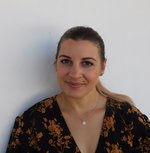
Marta Missiaggia obtained both her bachelor's and master’s degrees in physics at the University of Trento, respectively in 2016 and in 2018. In 2022 she earned the Ph.D. in physics cum laude jointly from the University of Trento and Fondazione Bruno Kessler (FBK). She currently is a postdoctoral fellow at the Centro Ricerche Enrico Fermi (CREF). Her main interest is microdosimetry, both from an experimental and theoretical point of view. Her skills include the knowledge of the experimental setup and electronics, data analysis, Monte Carlo simulation (Geant4 and TOPAS), Machine Learning techniques, and mathematical modeling. She is the first or second-name author in 8 published or submitted papers in international renewed journals. She attended 9 international conferences with contributed talks on various aspects of microdosimetry. Marta is a Radiation Research Society (RRS) SIT member since 2019 and, from 2022, she is also a member of the SIT committee.
Stefanos Nanos ( Greece)
Research Interests
• Atomic Physics with Accelerators
• Fast Ion-Atom Collisions
• Electron Spectroscopy
• Mechanisms of Electron Capture, Ionization and Excitation
• Coincidence Techniques
• Atomic targets - Gascells & Jets
Education
Currently: Ph.D. candidate, University of Ioannina, Ioannina, Greece
Title: “Mechanisms of electron capture and ionization in fast ion-atom collisions”
2019: M.Sc. in Physics, University of Ioannina, Ioannina, Greece
Diploma Thesis: “Electron capture to the continuum in fast collisions of protons with gas targets”
2017: Undergraduate Degree in Physics, University of Ioannina, Ioannina, Greece
Thesis: “Evaluation of the lifetimes of the metastable state 1s2s2p 4Pj"
2019: 1st TUMIEE Training School, Rethymno (Crete), Greece
2108: HGS-HIRe Summer Student Program 2018 at GSI, Darmstadt, Germany Project: “Simulations and assembling for the ESR internal target station
Work Experience
Dec 2020: Support work for faculty members of the Department of Physics at the University of Ioannina, Ioannina, Greece.
May 2019 - November 2020: Fixed-term contract researcher in Atomic Physics with Ac-celerators at NCSR “Demokritos”, Institute of Nuclear and Particle Physics, Greece.
Giada Onorato (Italy)
In 2017 I graduated with honors at University of Naples Federico II. In October 2018 I won a scholarship and I started my research activity with Dr. Elia Di Schiavi at the Institute of Biosciences and BioResources, CNR in Naples, where, in collaboration with Prof. Adriana Maggi of the University of Milan, I investigate the molecular and genetic causes underlying the gender specificity of Parkinson's-related disorders using the model organism C. elegans. Since 2019 I am PhD student and I started my doctoral research with Dr. Elia Di Schiavi in collaboration with Prof. Ferdinando Di Cunto of the University of Turin. My doctoral project is focused on understanding the effect of space radiations on the central nervous system in different genetic backgrounds, using C. elegans as a model organism.
Mona Plettenberg (Germany)
Since my childhood, I am enthusiastic about physics, medicine, and aerospace. As a doctoral student at the Institute of Aerospace Medicine at German Aerospace Center, Cologne, and Justus-Liebig University, Gießen, Germany, I can now combine my various scientific interests. I aim to perform a risk assessment for malfunctions of implanted medical devices caused by particle radiation which is found at aviation altitudes or in radiation therapy. My versatile work includes experiments at radiation facilities as well as theoretical analyses and Monte Carlo simulations. With my research, I strive to contribute to further improvement of radiation protection for humans on Earth and in space. I studied medical physics at Heinrich-Heine University, Düsseldorf and University of California, Davis and received my bachelor’s and master’s degree in 2017 and 2019, respectively.
Axel Rosendahl Huber (Spain)
Axel Rosendahl Huber was born in Roosendaal, the Netherlands. After finishing his secondary education at the Gertrudiscollege, Roosendaal, he started his bachelor Biomedical Sciences at Utrecht University in 2011. After finishing this bachelor, in 2015 he started his master Cancer, Stem Cells and developmental Biology (CSND), also at Utrecht University. During this master, he performed internships on cell polarity at the UMC Utrecht, and at the University of California, San Francisco (UCSF), working on mouse intestinal stem cells. In October 2017, he started his PhD in the group of Ruben van Boxtel at the Princess Máxima Center for pediatric oncology in Utrecht. During this PhD, Axel focused on mutagenic mechanisms active in normal cells during life. In addition, environmental exposures, such as chemotherapy and mutagenic baceteria were studied. After his defense, Axel works as a postdoctoral fellow in the group of Núria Lopez-Bigas at the Institute for Research in Biomedicine (IRB) in Barcelona to study the incidence of mutations across the genome to better understand the development of cancer as a result of mutagenic processes.
Esther Schickel (Germany) (Auditor)
01/2021 - expected 12/2023 PhD student (Technical University Darmstadt and GSI Helmholtz Centre for Heavy Ion Research Darmstadt, Germany)
08/2017 - 09/2020 entre for Heavy Ion Research Darmstadt, Germany)
M. Sc. Technical Biology (Technical University Darmstadt, Germany) Specialization in neurology, radiation biology and cell biophysics Laboratory practical courses (GSI Helmholtz Centre for Heavy Ion Research Darmstadt and University Hospital Essen in the Medical Research Centre for Skin Cancer, Germany)
10/2014 - 08/2017 B. Sc. Biology (Technical University Darmstadt, Germany) Specializations in radiation biology, developmental biology, animal physiology and biophysics of ions.
Laura Schwan (Germany) (Auditor)
My name is Laura and I’m a PhD student at GSI and TU Darmstadt since 2021. I did my bachelors and masters degree in biophysics at Goethe University Frankfurt/Main from 2015 to 2020. In 2019 I did a short internship at GSI where I had my first contact with radiation biophysics, which is now my major research focus. My PhD project, which is embedded in the ESA IBER 19 program at GSI, is about the impact of galactic cosmic rays on DNA damage and repair in human cells. This includes the evaluation of the DNA double strand break (DSB) load and repair outcome after the traversal of heavy ions through the cell nucleus.
Vasily Sorokin (UK)
I graduated from the Moscow Engineering Physics Institute with a degree in nuclear physics and completed my BSc thesis on the production of Molybdenum-99. I then attained an Erasmus Mundus Master's Degree in Applied Nuclear Physics. During my MSc thesisat University of Seville, I compared cell damage after proton and photon irradiations to investigate the radiobiological effects of low-energy protons.
I am now a first year PhD student in Oncology at University of Oxford in the group of Dr Mark Hill.The aim of my project is to enhance the understanding of the radiobiological effects of high-LET radiation in 2D/3D models of head and neck cancer and glioblastoma. I am focused on the Monte Carlo simulations to provide dosimetry and characterization of the Birmingham cyclotron as well as obtainLET spectra through biological samples.
Edward Taylor (UK)
I am a first year oncology DPhil candidate at the University of Oxford developing equipment to enable ultra-high dose rate, FLASH photon radiotherapy. My interest in oncology and space radiation equipment stemmed from my year abroad in Illinois, where I analysed life support systems for a lunar lander concept, developed a micrometeoroid detection and repair device for the handrails of the ISS, and investigated magnetic braking for the SpaceX Hyperloop challenge. From these experiences I learnt more about the space environment, project management and radiation mitigation strategies. I also started to see the overlap between the dosimetric challenges faced in space and oncology, so for my masters I performed dosimetry experiments to detect FLASH for protons using the MC40 cyclotron. In this time, I also established the University of Birmingham space society to enable students to connect with the wider UK space network, engage in outreach and get involved in projects. After graduating from Birmingham, I worked at BAE systems analysing and optimising telemetry software for ESA. I then decided to apply the programming skills I learnt here to an Oncology DPhil at Oxford. I am extremely excited to have been invited to attend the ESA-FAIR summer school, and look forward to learning from experts and collaborating with other students throughout my time there.
Andreas Waets (Switzerland)
Born and raised in Belgium, I studied nuclear physics at the KULeuven university. Directly after studying I received the opportunity to do an internship at the European Space Agency. Working and living in the Netherlands, I gained invaluable experience of what it is like to work as a space environment engineer, providing project support to various ongoing space missions. After ESA, I worked as Fellow at CERN on the High-Luminosity Large Hadron Collider project, using Monte Carlo simulations to ensure that envisaged upgrades of the LHC can protect the accelerator equipment against beam losses. Currently I am in the first year of my PhD project, investigating ground-based irradiation testing facilities for beyond-LEO exploration in cooperation with the University of Zurich, ESA and CERN where I am still based. Besides being very passionate about space and spaceflight, in my spare time I love doing sports like triathlon and skiing but I also enjoy drawing and pub quizzes.





